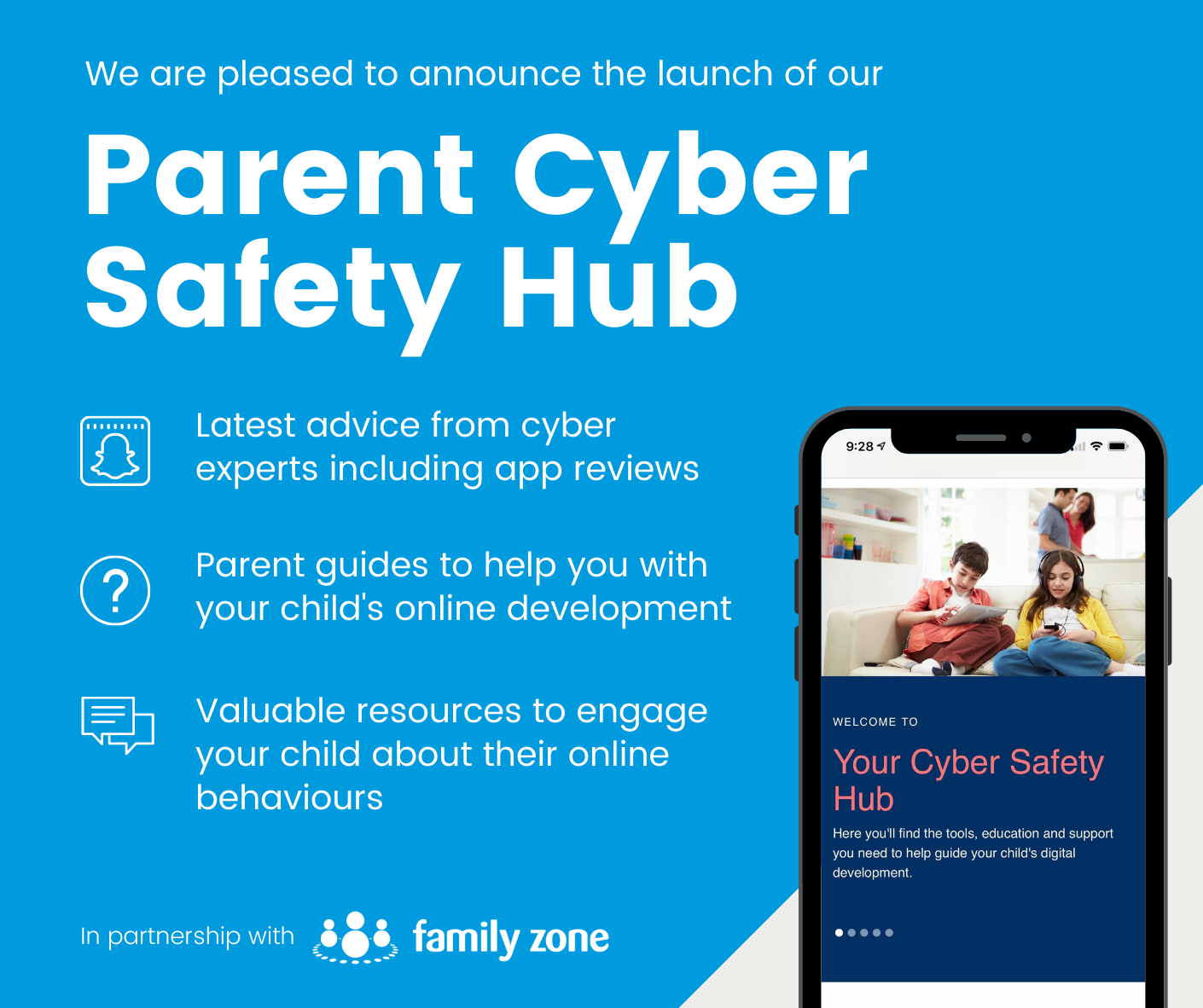Cyber Safety

Introducing our new Cyber Safety Hub
We are delighted to introduce you to a new resource made available to you through our partnership with Family Zone - our new school Cyber Safety Hub.
As you may already be aware, our partnership provides your family with access to the Family Zone tools to use at home with your children if you wish. The purpose of the Cyber Safety Hub is to complement those tools with practical guidance and information to further support you in engaging with your children in their digital development. These tools and resources also allow the school and parent body to work together on creating a holistic approach to guiding each student's online journey.
You can access the Cyber Safety Hub using the link below:
https://johnxxiii.cybersafetyhub.com.au/
About the Parent Cyber Safety Hub
The Cyber Safety Hub includes resources to help your family better understand the different Family Zone tools available to you and how to use them, plus access to regular cyber safety events to help you stay informed about the latest digital trends.
Also, the Cyber Safety Hub provides expert advice from leading cyber experts, ySafe, on the most pertinent issues and frequently asked questions around platforms like TikTok, Fortnite, Instagram, and more. There are app reviews with age and safety recommendations, along with a range of guides to help ensure healthy boundaries around screen-time & gaming, plus step-by-step instructions for using parental controls and filtering out inappropriate content.
We are very excited to be able to offer you this level of expertise and support. We look forward to working closely with you as we develop the cyber safety conversation within our school community.
Vocabulary quiz: 4 new words to describe our digital lives right now
Remember when you thought FOMO was a new Asian restaurant? Or even further back when you would have sworn LOL meant “lots of love”?
As our online lives have evolved so too has the lingo we use to describe it. Here are four of the buzziest new words to emerge from the COVID 2020, aka The Year of Living Virtually.
Nomophobia
(Noun.) The fear of being separated from one’s mobile phone.
Major symptoms include racing heart, shaking hands and wild-eyed scrabbling under the car seat upon discovering (or simply fearing) that the phone has been left at home. Moaning, shrieking and rending of garments may also ensue.
According to a report in The Economist, “Teenagers seem more likely to suffer from nomophobia than their parents.”
The reason, researchers say, is that “young people often associate their phones with memories, in the form of photos and intimate messages.”
Some teens even see their devices “as extensions of themselves” - so no wonder they freak out when they disappear between the sofa cushions.
Yanny
(Noun.) Anything that distracts internet users for at least 24 hours.
In digital years (which are like dog years, only in reverse), 2018 seems practically a geological age away. But if you can remember back that far, you may recall that was the year when a certain auditory illusion went viral.
All it took was a short clip of a computer-generated voice saying a word that half of us heard as “Yanny” and the other half as “Laurel” - sparking a controversy so passionate it practically broke the internet.
Well, that’s a “Yanny” - one of those moments that briefly bonds, or divides, us online. A recent example? The absurdly adorable knitted mittens worn by Bernie Sanders at the inauguration of Joe Biden.
The internet couldn’t get enough of the mittens that launched a million memes, which was Photoshopped on everything from great works of art to album covers.
低头族 (ditouzu in Mandarin)
(Noun.) Trans: the low-head tribe
Leave it to the Chinese to invent a poetic yet quietly devastating way to describe smartphone addicts. Because, yep - that’s what ditouzu means: the clan of true believers who bow their heads low while glued to their screens, oblivious to the real world around them.
In China, parents don’t need to nag their children to get off their phones. The government does it for them.
In several cities, you can be fined for crossing the road while staring at a device. On the subway, passengers are reminded to look up at arriving trains. And the state-controlled media describe smartphones as “spiritual opium.”
Is the campaign working? The nation’s 930 million phone users don’t seem overly hung up about it.
Doomscrolling
(Verb.) Compulsively reading negative news online.
Here’s one you’re probably already familiar with - because it’s a digital affliction suffered mainly by the grown-ups.
For whatever reason, human beings have always been drawn to stories of misery, tragedy and apocalypse. We’re just a fun bunch that way.
And the events of the past year - coupled with a voracious 24-hour news cycle and the means to access it instantly - have created a perfect storm for indulging that impulse.
For whatever reason, human beings have always been drawn to stories of misery, tragedy and apocalypse. We’re just a fun bunch that way.
Why do we do this? Psychologists theorise that our drive to consume bad news is a primitive survival response - at some level, we are gathering information to help us avoid destruction.
But in the age of social media, this possibly adaptive reflex is anything but life-giving. There is even an account on Twitter, @QuittrBot, that generates periodic reminders to hardcore doomscrollersVo to do something else instead.
Reference: https://www.familyzone.com/anz/families/blog/vocabulary-quiz-new-words-describe-digital-lives


